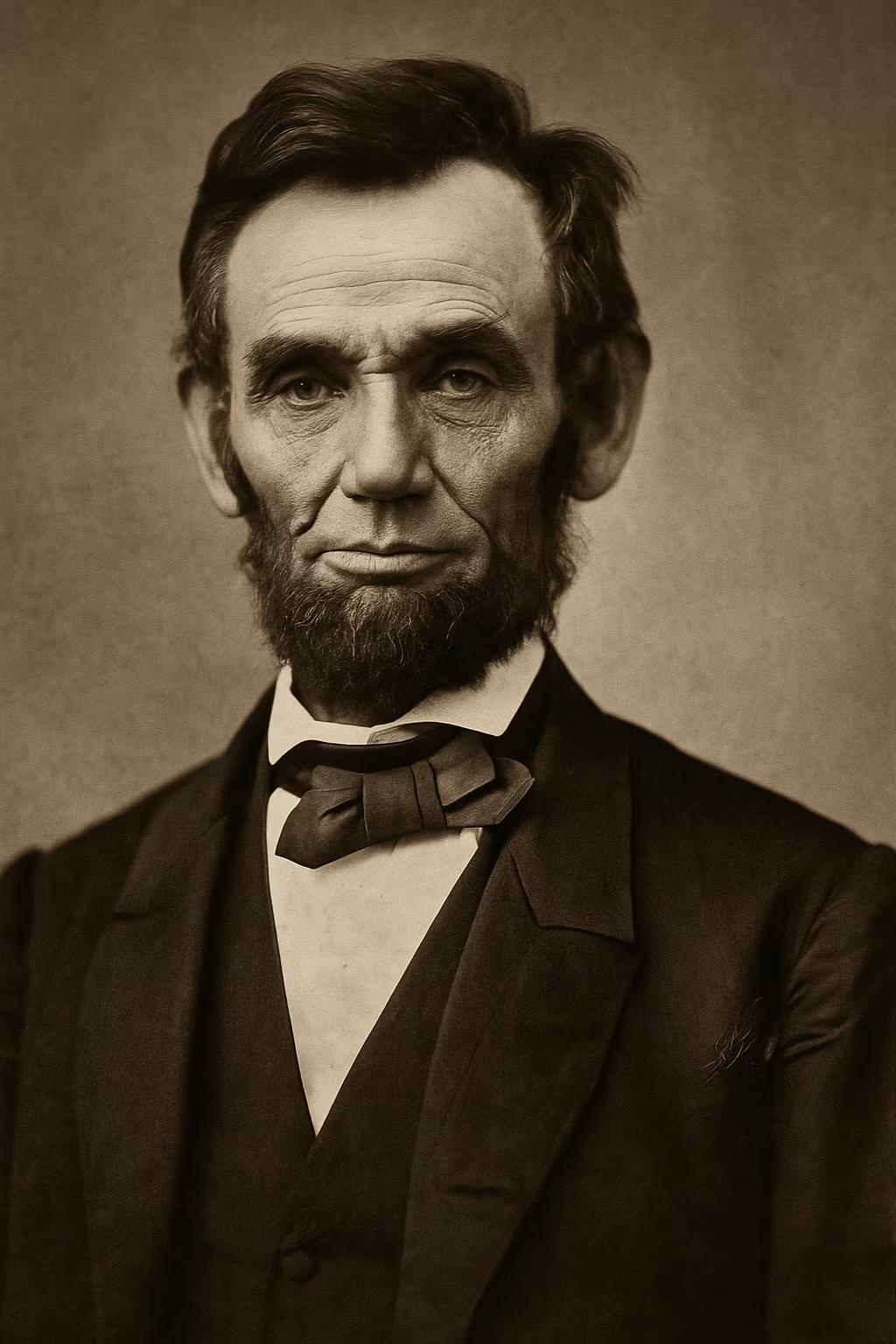Abraham Lincoln (1809 – 1865)
Quick Summary
Abraham Lincoln (1809 – 1865) was a lawyer and major figure in history. Born in Sinking Spring Farm, Hardin County (now LaRue County), Kentucky, United States, Abraham Lincoln left a lasting impact through Preserved the Union during the American Civil War.

Birth
February 12, 1809 Sinking Spring Farm, Hardin County (now LaRue County), Kentucky, United States
Death
April 15, 1865 Washington, D.C., United States
Nationality
American
Occupations
Complete Biography
Early Life
Born on February 12, 1809, at Sinking Spring Farm (Kentucky), Lincoln grew up in a modest frontier family. After Knob Creek, the family moved to Indiana (1816). His mother, Nancy Hanks Lincoln, died in 1818; in 1819 his father married Sarah Bush Johnston, who encouraged Abraham’s learning. He attended backcountry schools irregularly but read extensively (Bible, Shakespeare, history, law). In 1830 the family relocated to Illinois; Lincoln worked as a laborer, Mississippi flatboatman, and store clerk in New Salem, and briefly served as a militia captain in the Black Hawk War (1832).
Education And Early Career
Largely self-taught, Lincoln read law and was admitted to the Illinois bar in 1836. He moved to Springfield, building a prominent litigation practice (notably in railroad and commercial cases) with partners John T. Stuart, Stephen T. Logan, and later William H. Herndon (“Lincoln & Herndon”). He served four terms in the Illinois House of Representatives (1834, 1836, 1838, 1840). In 1842 he married Mary Todd. Elected to the U.S. House of Representatives (1847–1849), he advanced Whig policies (internal improvements) and opposed the spread of slavery.
Political Rise
Returning to law in the 1850s, Lincoln reentered national politics after the Kansas–Nebraska Act (1854), denouncing slavery’s expansion in his Peoria speech (1854). He helped found the Republican Party (1856). The Lincoln–Douglas debates (1858) elevated him nationally despite losing the Senate race; his “House Divided” speech (1858) framed the crisis. Nominated by Republicans in 1860, he won the presidency without Southern support and took office on March 4, 1861.
Presidency
The Civil War defined his presidency (1861–1865). Aiming above all to preserve the Union, he reshaped military leadership (from McClellan to Grant), coordinated war mobilization, and managed diplomacy to prevent Confederate recognition. He backed transformative legislation: the Homestead Act (1862), Morrill Land-Grant Colleges Act (1862), Pacific Railway Acts, and National Banking Acts (1863–1864). He used wartime powers for measures including blockades, mobilization, and targeted suspensions of habeas corpus.
War And Decisions
On January 1, 1863, Lincoln issued the Emancipation Proclamation, freeing enslaved people in rebelling states and authorizing Black enlistment in the Union Army. His Gettysburg Address (November 19, 1863) reframed the war as a test of equality and popular government. He pressed for the 13th Amendment (passed by Congress on January 31, 1865) to abolish slavery nationwide. Reelected in 1864, he pursued a measured postwar reunification.
Assassination
On April 14, 1865—days after Robert E. Lee’s surrender at Appomattox (April 9)—Lincoln was shot by John Wilkes Booth at Ford’s Theatre in Washington and died on April 15 at the Petersen House. Vice President Andrew Johnson succeeded him.
Legacy
Lincoln’s legacy is tied to the Union’s preservation, slavery’s abolition, and a demanding vision of democratic citizenship. Memorialized at the Lincoln Memorial and consistently ranked among the top U.S. presidents in scholarly surveys, he remains a touchstone for rhetoric, statecraft, and crisis leadership.
Achievements and Legacy
Major Achievements
- Preserved the Union during the American Civil War
- Issued the Emancipation Proclamation (1863)
- Championed passage of the 13th Amendment abolishing slavery
- Shaped enduring rhetoric of democracy (Gettysburg Address)
Historical Legacy
Lincoln endures as a symbol of national unity, emancipation, and democratic ideals. His addresses and statecraft inform civic rhetoric and leadership studies worldwide.
Detailed Timeline
Major Events
Birth
Sinking Spring Farm, Kentucky
Black Hawk War
Serves briefly as militia captain
Admitted to the bar
Begins law practice in Springfield
U.S. House of Representatives
Single term (1847–1849)
Lincoln–Douglas Debates
National prominence despite Senate loss
Elected President
Republican victory; inaugurated March 4, 1861
Emancipation Proclamation
Frees enslaved people in rebelling states
Gettysburg Address
Defines war aims
13th Amendment
Congress passes abolition; later ratified
Assassination
Dies in Washington, D.C.
Geographic Timeline
Famous Quotes
“A house divided against itself cannot stand.”
“…government of the people, by the people, for the people, shall not perish from the earth.”
Frequently Asked Questions
When was Abraham Lincoln born and when did he die?
Born February 12, 1809; died April 15, 1865.
What did the Emancipation Proclamation do?
It declared freedom for enslaved people in states rebelling against the Union and allowed Black enlistment.
What is the significance of the 13th Amendment?
It abolished slavery throughout the United States.
Why is the Gettysburg Address famous?
It succinctly redefined the war’s purpose around equality and popular government.
How did Lincoln die?
He was assassinated by John Wilkes Booth at Ford’s Theatre; he died the next morning.
Sources and Bibliography
Primary Sources
- Collected Works of Abraham Lincoln
- Abraham Lincoln Papers at the Library of Congress
- National Archives – The Emancipation Proclamation (1863)
Secondary Sources
- David Herbert Donald, Lincoln
- Doris Kearns Goodwin, Team of Rivals: The Political Genius of Abraham Lincoln
- Eric Foner, The Fiery Trial: Abraham Lincoln and American Slavery
External References
See Also
Specialized Sites
Batailles de France
Discover battles related to this figure
Dynasties Legacy
Coming soonExplore royal and noble lineages
Timeline France
Coming soonVisualize events on the chronological timeline